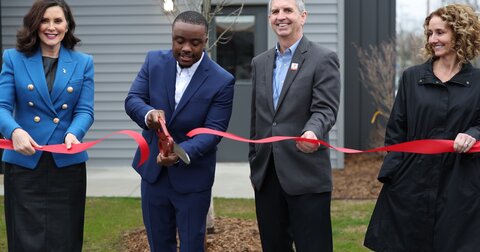Michigan’s efforts to boost housing are far short of what is needed
Even spending billions of dollars isn’t coming close to meeting demand
The Michigan State Housing Development Authority financed the construction or rehabilitation of 3,143 housing units in 2014. Just nine years later, the state’s housing authority nearly tripled its output, financing 8,944 units. That’s impressive growth, but it’s not enough for what Gov. Gretchen Whitmer promised she would do.
The governor released a statewide housing plan in 2022 with the goal of creating 75,000 affordable housing units in five years. The housing authority would have to replicate in a single year the increase it achieved over nine years and then maintain the new level for another four.
Whitmer has since created another new housing goal. In her 2024 State of the State address, she promised the state housing authority would build 10,000 units at a cost of $140,000 each, or $1.4 billion in taxpayer funds. That's a more realistic and modest goal.
The state housing agency just announced its largest projects to date this calendar year, which aims to create 1,117 units. The state is giving $250 million in tax credits to developers who will rehab or build these units. That’s about $224,000 per unit. At that rate, the housing authority could build 6,300 units with $1.4 billion, well short of the governor’s goal.
The Michigan housing authority spent about $137,000 per unit in 2023, so this latest project may be an aberration. But if it is sign of rising costs, it raises the question of whether the state can afford its plan.
For instance, if the state spent an average of $200,000 per unit on the 55,000 or so that would need to be built to meet the governor’s five-year goal, it would cost $11 billion. The could be spread out over a few years, but it’s hard to imagine the state redirecting or dedicating new revenue to just this one program.
The state housing authority says the state needs at least 190,000 new housing units.
At a Mackinac Center housing event last year, policy experts said Michigan’s main focus should be on loosening up restrictions which limit where and what people should build, largely through zoning rules.
“Housing affordability is getting worse across the country as a whole,” said Emily Hamilton, director of the Urbanity Project at the Mercatus Center. “A problem that used to really be restricted to some of the high-cost coastal parts of the U.S. is now affecting everybody.” Hamilton noted that California and Montana have recently passed statewide zoning reform laws, limiting the multitude of ways that local governments could block development.
Joshua Lunger of the Grand Rapids Chamber of Commerce said that local reform is necessary. “If you make it incredibly confusing to navigate a permitting or regulatory, the small builders and developers are the ones who won’t get through it. It will be just the big guys. ... There’s a benefit to making things more clear, concise and consistent for development.”
Michigan Capitol Confidential is the news source produced by the Mackinac Center for Public Policy. Michigan Capitol Confidential reports with a free-market news perspective.


 In Michigan, regulations contribute to high housing costs
In Michigan, regulations contribute to high housing costs
 ‘Renters rights’ legislation is about optics, not solutions
‘Renters rights’ legislation is about optics, not solutions
 The house always wins: Michigan’s coming housing crisis will be man-made
The house always wins: Michigan’s coming housing crisis will be man-made